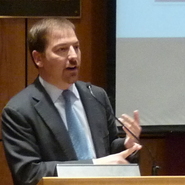
“Frankly, they spend more money on this,” Todd said. “The Obama campaign is at another level compared to where the Republicans and [presumed GOP nominee Mitt] Romney are when it comes to using digital media to target voters when they are not looking for politics.”
Todd spoke with ClickZ after keynoting a Fordham University event in New York on Tuesday. He said Romney’s team is good at social networking but wonders if its Internet-wide strategy is on par with Obama’s.
“Everything is platform neutral now. So you have to figure it out,” Todd said. “I know the Obama campaign believes that they have to go 10 different places to reach the same amount of people [online] they used to reach. The question is, ‘Is the Romney campaign up to speed yet?’ I have my doubts right now.”
While the political analyst doesn’t believe a YouTube video has significantly affected the Republican primaries, he predicted that the general election candidates would be extremely wary of so-called “gotcha” moments.
“Anything can go viral and become a shiny metal object…. Does that limit the amount in which politicians interact with voters? That’s my fear. Politicians will not give you any real moments anymore. They all fear viral. [They] are constricted, and everyone is clenching.”
Todd’s appearance was part of an all-day Fordham conference that centered on media, money, and politics. One panelist, Richard Davis, political science professor at Brigham Young University, suggested that political digital advertising was catching up with the rest of the marketing world.
“We will see more nano-targeting,” he said. “They will know who you are and what your interests are.”